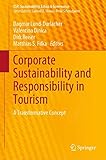Corporate sustainability and responsibility in tourism : a transformative concept / editors, Dagmar Lund-Durlacher, Valentina Dinica, Dirk Reiser and Matthias S. Fifka.
Material type: TextSeries: CSR, sustainability, ethics & governancePublisher: Cham : Springer, 2019Description: 1 online resourceContent type:
TextSeries: CSR, sustainability, ethics & governancePublisher: Cham : Springer, 2019Description: 1 online resourceContent type: - text
- computer
- online resource
- 9783030156244
- 3030156249
- 3030156230
- 9783030156237
- 9783030156251
- 3030156257
- 9783030156268
- 3030156265
- 338.4791 23
- G156.5.S87
| Item type | Current library | Shelving location | Call number | Status | Date due | Barcode | Item holds | |
|---|---|---|---|---|---|---|---|---|
 Electronic Book
Electronic Book
|
Kuakarun Nursing Library | Processing unit | Online Access | Eb35498 |
Intro; Preface; Contents; Editors and Contributors; Introduction; 1 Challenges for Tourism-Transitioning to Corporate Sustainability and Responsibility; 1.1 Global Challenges for Tourism-Braving the New World Sustainably and Responsibly; 1.2 Voluntary Responses to Calls for Corporate Responsibility; 1.3 Corporate Social Responsibility: Milestones in Conceptualisation; 1.4 CSR Implementation: Research Approaches, Findings and Limitations; 1.5 Critique on Business Engagement with Corporate Social Responsibility; 1.6 The Main Features of Corporate Sustainability and Responsibility-CSR 2.0
3.2 Global Human Trafficking and Links to the Travel and Hospitality Business3.3 Combating Sex Trafficking in the Context of CSR 2.0 in Tourism; 3.4 Case Studies; 3.4.1 Aviation and Airlines Engagement to Prevent Child Sex Trafficking; 3.4.2 Uber; 3.4.3 Marriott; 3.5 Concerns and Pitfalls; 3.6 Recent Legal Limits on Travel for Convicted Offenders; 3.7 Summary and Conclusion; References; 4 Accessible and Equitable Tourism Services for Travelers with Disabilities: From a Charitable to a Commercial Footing; 4.1 Introduction; 4.2 Views on Disability, Recreation, and Tourism
4.3 Social Participation of Persons with Disability in Recreation and Tourism4.4 Inclusive Holidays Based on Sighted Guiding; 4.5 Reverse Integration in a (Social) Business Context; 4.6 Conclusions; References; 5 Can You Hear Me? A Research of Touristic Demand from and Supply for Deaf Travelers; 5.1 Is There a Tourism for All?; 5.2 Accessible Tourism; 5.3 The Disabled Traveler; 5.4 The Deaf Traveler; 5.5 An Analysis of the Packages for Deaf Tourists; 5.5.1 Core Product; 5.5.2 Additional Services; 5.6 Supply and Demand in Comparison; 5.7 Conclusion: "Tourism for All" Is Ready to Take off
This book offers essential insights into how the world's second largest industry, tourism, is responding to challenges involved in expanding the corporate social responsibility (CSR) concept to corporate sustainability and responsibility, referred to as CSR 2.0. It analyzes the typical setup of tourism with various types of commercial agents: corporations, small and medium sized enterprises, public-private partnerships, social enterprises and local cooperatives. In addition, the book examines a broad range of voluntary initiatives, the effectiveness of these efforts, and how contextual and wider policy features shape these relationships. The book is divided into three parts, the first of which elaborates on strategic drivers and rationales for CSR. In turn, the second part introduces readers to design approaches for CSR programs and envisaged impacts, while part three focuses on implementation, certification, reporting, and possible outcomes. Each part offers a mixture of theoretical perspectives, synthesis analyses and case studies. The respective chapters tackle a broad spectrum of tourism sub-sectors, e.g. the cruise industry, aviation, gastronomy, nature-based tourism, and urban destinations.
Online resource; title from PDF title page (EBSCO, viewed May 7, 2019)
Master record variable field(s) change: 072
There are no comments on this title.

